Content

Symposium program
Osez le Féminisme and the French Coordination for the European Women’s Lobby have organised the International Conference on Online Sexual Exploitation: Challenges and Responses in Europe, on 14 February 2025. Discover our programme, which includes panels, discussions with renowned experts, testimonies, and exchange moments to collaboratively imagine concrete solutions.
Conference Content
What to expect?
The transnational nature of cybercrimes requires a coordinated response supported by regional and international cooperation mechanisms.
The increase in lawsuits against the pornography industry, ongoing legal debates on the protection of minors online, the enforcement of Directive 2024/1385 on combating violence against women, and the Digital Services Act, which addresses platform liability, collectively create a favorable context for concrete action to combat all forms of online sexual exploitation.
This conference will bring together parliamentarians, government officials, Members of the European Parliament, experts, lawyers, researchers, and civil society organizations. Together, let us ensure the protection of fundamental rights for all online.
8:30 am : Welcome Reception
Public reception and breakfast
9:00 am - 9:45 : Opening speeches
9:45 am - 11 am : New technologies, sexual exploitation, and violence against women and men: challenges and responses
New technologies exacerbate prostitution, surrogacy, and online gender-based violence. Platforms like OnlyFans, where sexual exploitation and human trafficking have been reported (Reuters, 2024), and the growing use of artificial intelligence to humiliate and silence women (+330% in deepfakes between 2019 and 2023, Deeptrace), highlight these issues. While the European Directive on violence against women (2024) is a step toward regulation, it remains insufficient to fully protect their rights. This panel will explore these challenges and propose concrete solutions.
Moderator : Alyssa Ahrabare, president of the French Coordination for the European Women’s Lobby (CLEF)
- Evin Incir, Swedish MEP, rapporteur for Directive 2024/1385 on combating violence against girls and women
- Ruth Breslin, Director of the Institute for Policy Research on Sexual Exploitation
- Mariana Branco, researcher at the Portuguese Platform for Women’s Rights
Questions – Answers
11:30 am - 1 pm : Pornocriminality and pedocriminality : A Concern for Equality, Public Health, and Child Protection
Introduction: Screening of the documentary Be Brave France by Mié Kohiyama
This panel will shed light on alarming data about the impact of the pornography industry on mental health, violence, and the shaping of relations between women and men. A study by the High Council for Gender Equality reveals that 90% of scenes in the most-watched pornographic films contain acts of physical or verbal violence, contributing to the normalisation of aggressive behaviours in intimate relationships. Additionally, the panel will focus on the legal disputes surrounding access control to pornographic websites, highlighting the limitations of current European regulations in protecting children.
Moderator : Alienor Laurent, President of Osez le Féminisme
- Céline Piques, Writer of the High Council for Equality’s report on pornocriminality, representative of Osez le Féminisme
- Hélène Fritzon, Swedish MEP, Rapporteur of the FEMM Committee opinion on the Directive on child sexual abuse
- María Hernández-Mora, PhD in Psychology, Clinical Psychologist, and Psychotherapist
- Laurence Rossignol, French Senator
Questions – Answers
2:45 pm - 3:30 pm : Keynote spechees
- Alyssa Ahrabare, President of the French Coordination for the European Women’s Lobby
- Aurore Bergé, Minister Delegate for Equality between Women and Men and the Fight against Discrimination (video)
- Delphine O, Ambassador, Secretary General of the Generation Equality Forum (Beijing+25)
- Alexandra Louis, Interministerial Delegate for Victim Support
- Maria João Faustino, member of the executive committe of the European Women’s Lobby
3:30 pm - 4:45 pm : Addressing Prostitution : The Impact of Different Policy Models in Europe
Introduction: Testimonia video from Blessing Okoedion, survivor of human trafficking and prostitution, founder of Weavers of Hope
European Parliament Resolution 2022/2139(INI) on prostitution highlights that this practice constitutes a form of violence against women and girls, urging Member States to adopt measures to reduce demand and strengthen the protection of victims. This panel will examine the legislative models adopted in Europe to address prostitution, analyzing their social, economic, and human impacts while integrating the growing digital dimension of this phenomenon and its specific effects on migrant women.
- Maria Noichl, German MEP, rapporteur of the European Parliament’s September 2023 resolution on prostitution
- Françoise Brié, Representative of Amicale du Nid, Vice-President of CLEF, and former GREVIO member
- Adama-Sira Le Blay, President of the European Network of Migrant Women
- Stephanie Caradec, director of Mouvement du Nid
Questions – Answers
5:15 pm - 6:30 pm : Current Legal Challenges in France and Europe: Using the Law to End Impunity
Introduction: Video testimony from a survivor of the pornography industry.
In France, ongoing legal cases highlight the key role of the courts in penalising systemic violent practices, including torture, committed by the pornography industry (rape, pimping, human trafficking).
The right to control one’s own body cannot become a right to consent to its alienation.
This panel will offer a crucial perspective on applying fundamental legal principles, such as human dignity and the right to physical and mental integrity, while advocating for collective action to reform national and European legislation on online sexual exploitation.
Moderator :Floriane Volt, Director of Public and Legal Affairs at Fondation des Femmes
- Muriel Fabre Magnan, Professor of Law at Sorbonne University, author of “L’Institution de la liberté”
- Lorraine Questiaux, lawyer specializing in the defense of survivors of pimping and pornocrime
- Mireia Crespo, director and Natasha Malviya, volunteer jurist for Isala field association
Questions – Answers
6:30 pm - 7:30 pm : Closing remarks and call to action
Drawing on the day’s testimonies, legal analyses, and discussions, this session will issue an urgent call to strengthen legislative frameworks and intensify collaboration between States, European institutions, and civil society to provide better responses to online sexual exploitation.
- Alyssa Ahrabare, President of the French Coordination for the European Women’s Lobby, and Céline Piques, Writer of the High Council for Equality’s report on pornocriminality, representative of Osez le Féminisme
- Speech by Alexandra Dethyre, Project Manager of the RAJA Foundation
- Presentation of the Strasbourg Call, concrete recommendations co-created by partner organizations, followed by a group photo.
Association/NGO stands were also present, offering books and reports related to the conference topics.
The conference has featured live graphic facilitation by Christel Han – bananako.fr: Christel is an illustrator and graphic facilitator. Like an interpreter, she will capture and visually transcribe the discussions from the roundtables in the form of drawings. At the end of the discussions, the boards have been presented during the Q&A session, providing a visual aid to reflect on the ideas discussed. The finalised boards can be found below.
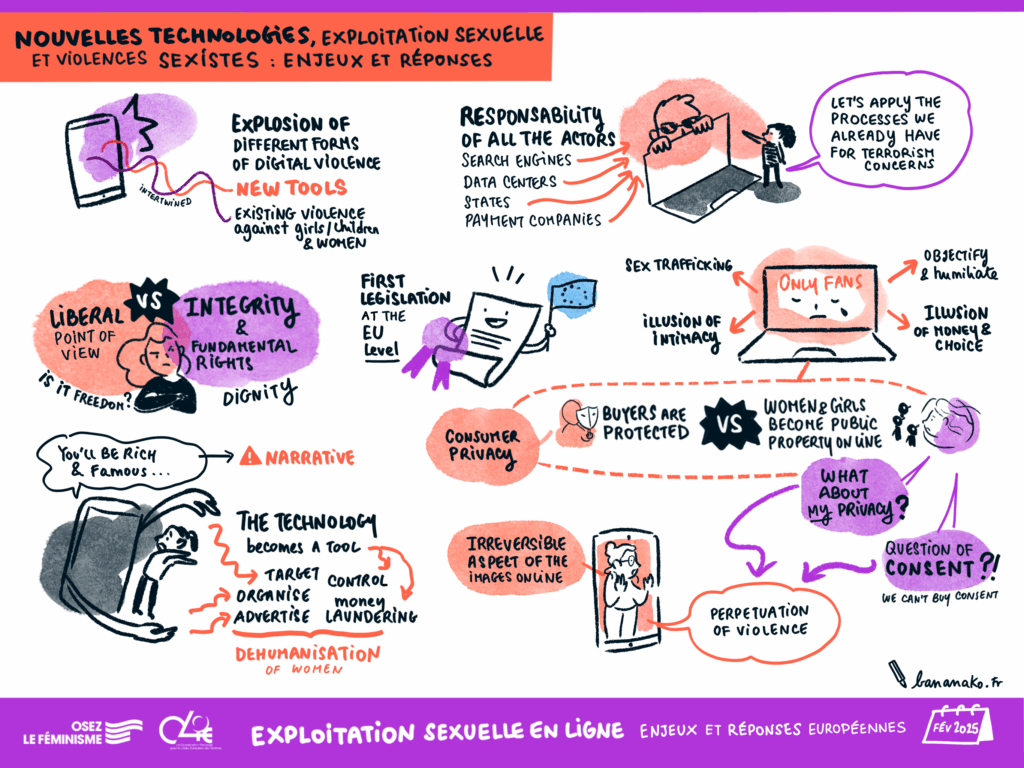
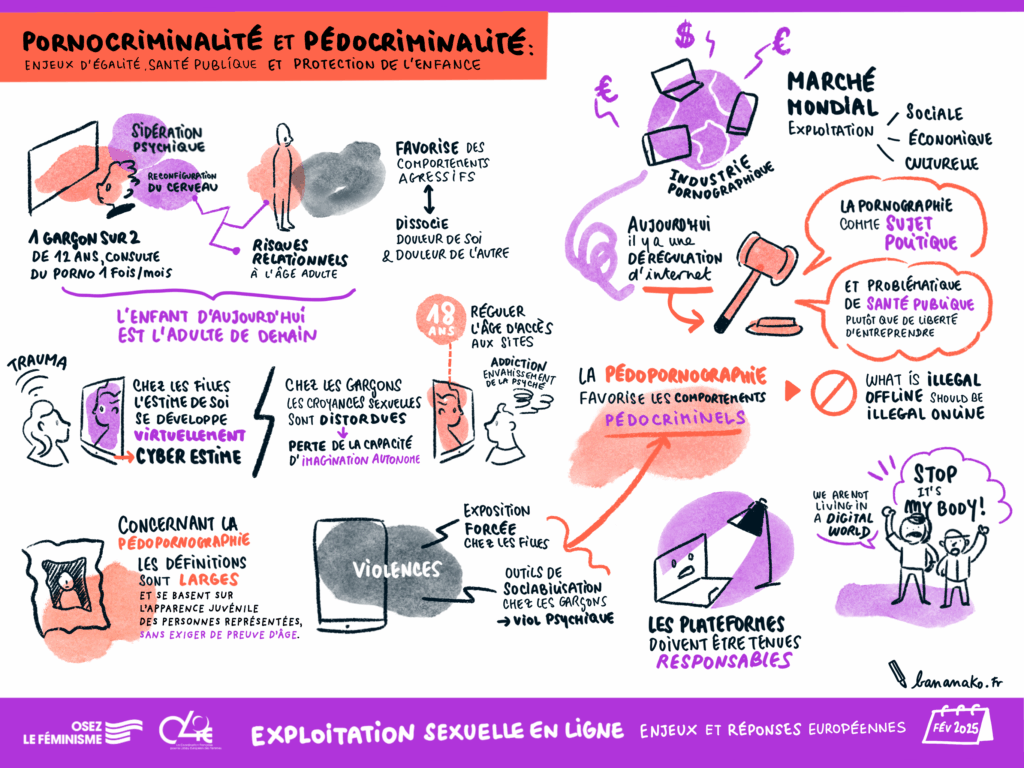
Speakers
REem
alsalem
United Nations Special Rapporteur on violence against women and girls, its causes and consequences, since August 2021. She holds a Master’s degree in International Relations from the American University in Cairo, Egypt (2001) and a Master’s degree in Humanities from Oxford University, United Kingdom of Great Britain and Northern Ireland (2003). She is an independent consultant on gender issues, refugee and migrant rights, transitional justice and humanitarian aid.
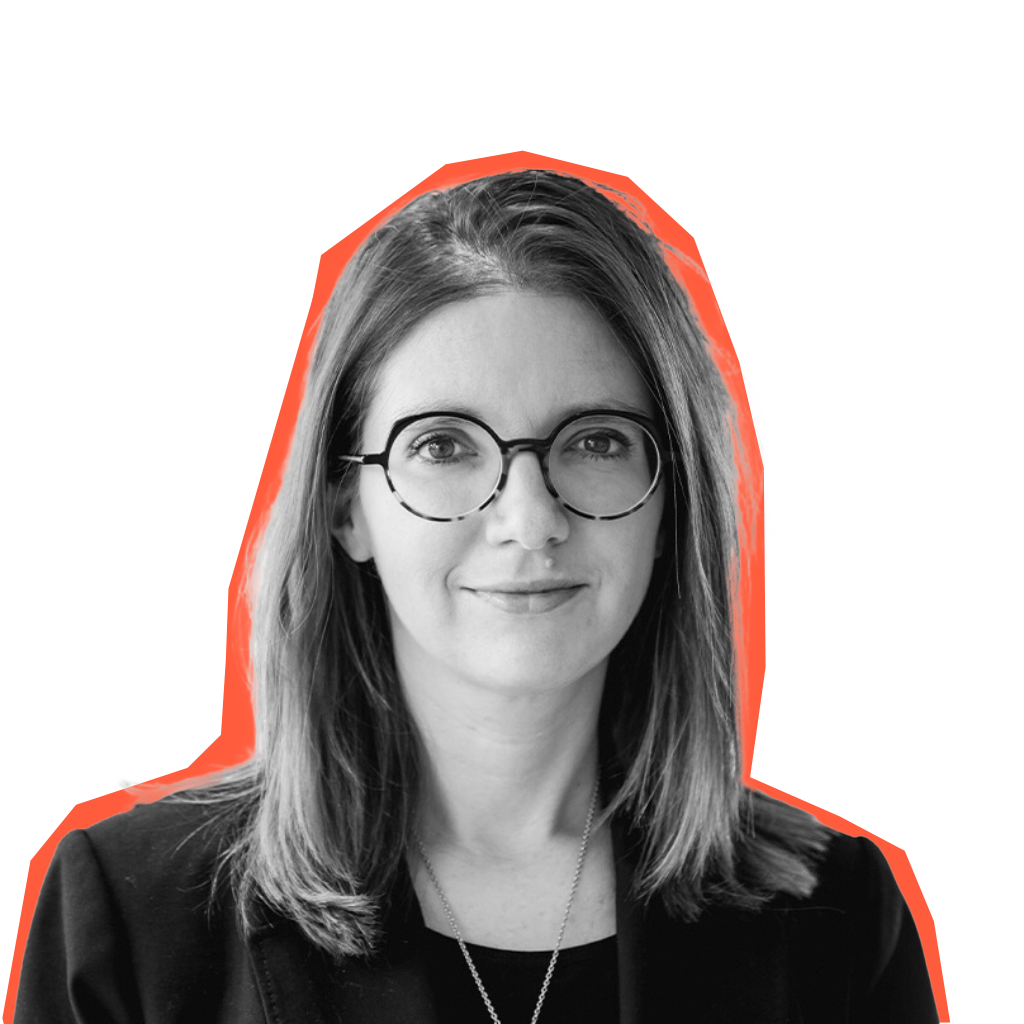
Aurore bergé
Minister Delegate to the Prime Minister, responsible for Gender Equality and Combating Discrimination

DELPHINE O
“New technologies are a formidable tool for emancipation and democratization, but all too often they are turned into weapons against women”.
Delphine O is ambassador-at-large and Secretary General for the Generation Equality Forum
(Beijing+25). She led the organization of the largest international summit for women’s rights since
1995, convened by UN Women and co-chaired by France and Mexico.
She was previously a Member of Parliament for La République en Marche, elected in Paris. A member
of the Foreign Relations Committee and chairwoman of the France-Iran friendship group at the
French National Assembly, she authored a report on the strategic stakes in the South China Sea.
Delphine O graduated from the Ecole Normale Supérieure and the Harvard Kennedy School. After
working at the French embassy in Seoul, the Consulate General in New York and the Stimson Center
in Washington, she moved to Iran and cofounded the information website “Persian Letters”.
She is a French-American Young Leader 2019, Munich Young Leader 2019, member of the Council at
the Council on Foreign Relations, member of the Strategic Orientation Board of the German Marshall
Fund France and a board member of IRIS (Institut des Relations Internationales et Stratégiques).
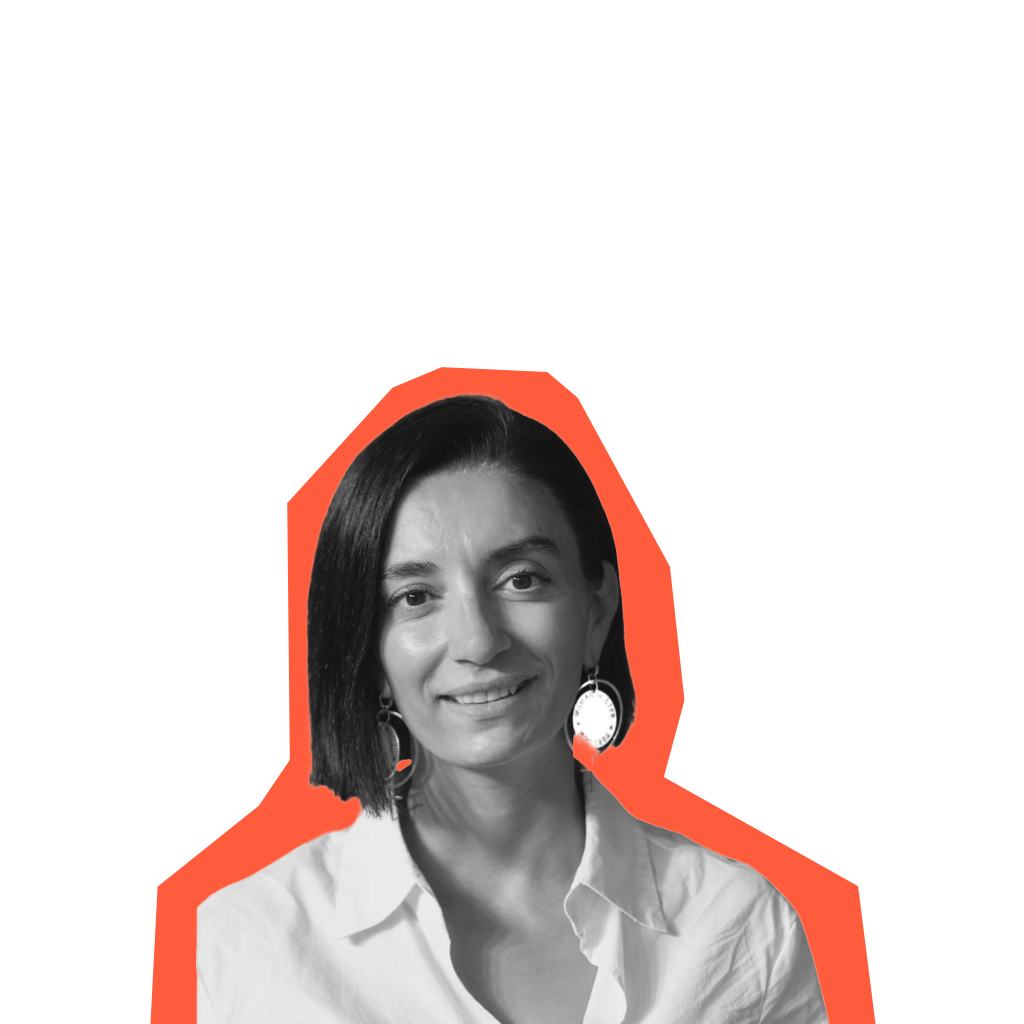
EVin incir
Evin Incir is a Member of the European Parliament since 2019 for the Swedish Social Democratic Party. She has been an important voice for human rights, democracy and the rule of law. As the European Parliament’s lead negotiator, Evin Incir has played a key role in establishing the historic EU directive on combating violence against women and domestic violence. The law was successfully passed during the last plenary session of the parliamentary term in April 2024 and represents a historic step in combating violence and strengthening women’s human rights within the Union.

maria noichl
Maria Noichl (S&D) is a German member of the European Parliament since 2014. She is a member of the Committee on Agriculture and Rural Development as well as the Committee on Women’s Rights and Gender Equality. She was the rapporteur of the own initiative report on the different regulations of prostitution in the EU and is a strong advocate for the Nordic Model approach.
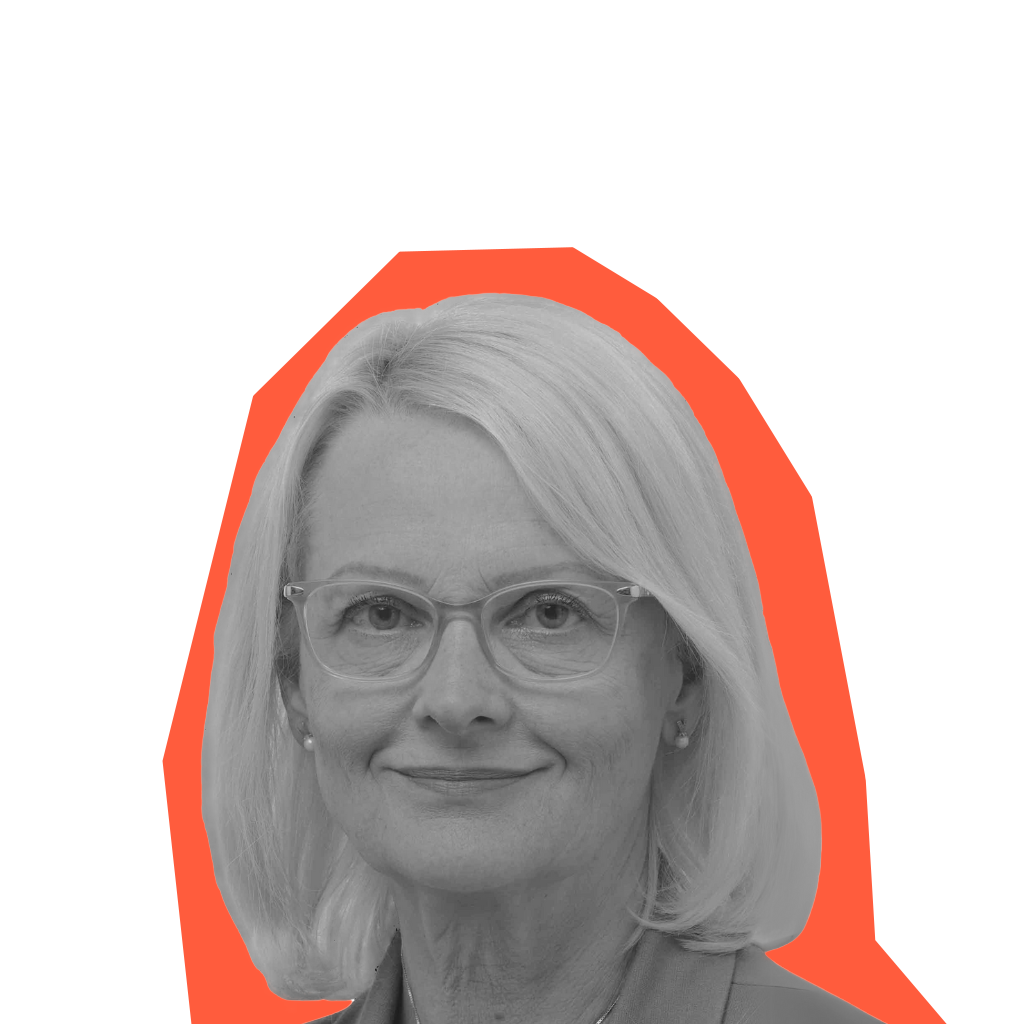
hélène
FRITZON
Heléne Fritzon is a Swedish politician of the Social Democrats. She is a Member of the European Parliament (MEP) and the Vice-President of the Socialists and Democrats, responsible for gender equality and children’s rights.
Heléne Fritzon served as Minister for Migration from 2017 to 2019. Before becoming a cabinet minister, Fritzon was Mayor of Kristianstad Municipality.
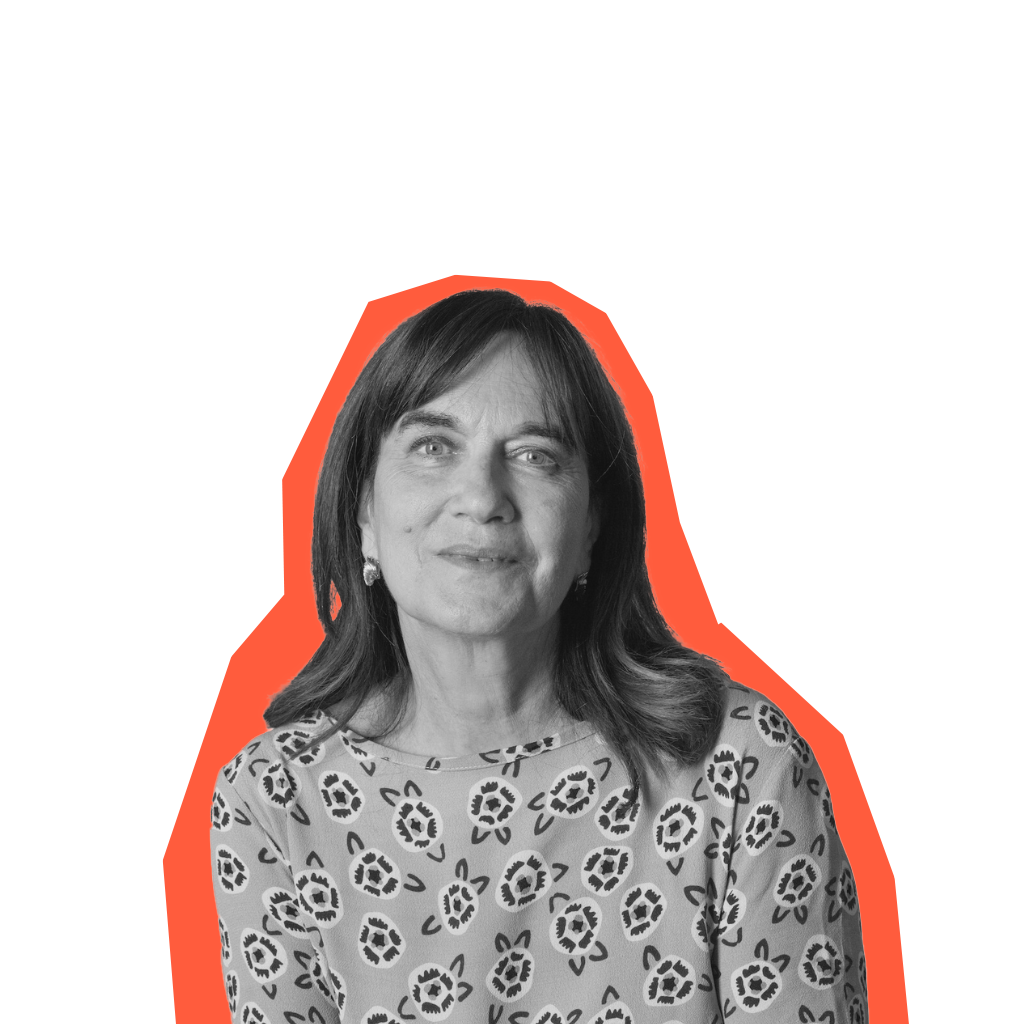
laurence rossignol
Laurence Rossignol is a feminist activist, Socialist Senator for Val-de-Marne, President of the Assemblée des Femmes and former Minister for Families, Children and Women’s Rights.

alexandra louis
Alexandra Louis has been the Interministerial Delegate for Victim Support since October 31, 2022.
A lawyer at the Marseille Bar until 2020, she specialized in criminal law and labor law. She was elected as a Member of Parliament in June 2017 for the 3rd constituency of Bouches-du-Rhône.
She served on the National Assembly’s Committee on Constitutional Laws, Legislation, and General Administration of the Republic. She actively participated in numerous parliamentary initiatives on issues related to combating sexual and gender-based violence, child protection, and, more broadly, justice and security matters. She was notably the rapporteur for the law of August 3, 2018, strengthening the fight against sexual and gender-based violence (known as the Schiappa law) and the law of April 21, 2021, aimed at protecting minors from sexual crimes, offenses, and incest.
Alexandra Louis co-chaired the National Assembly’s study group on Children’s Rights and Youth Protection. She was also deeply involved in the fight against substandard housing in Marseille. Additionally, she served in the Parliamentary Assembly of the Council of Europe and was the General Rapporteur on the situation of human rights defenders in the member states of the Council of Europe.
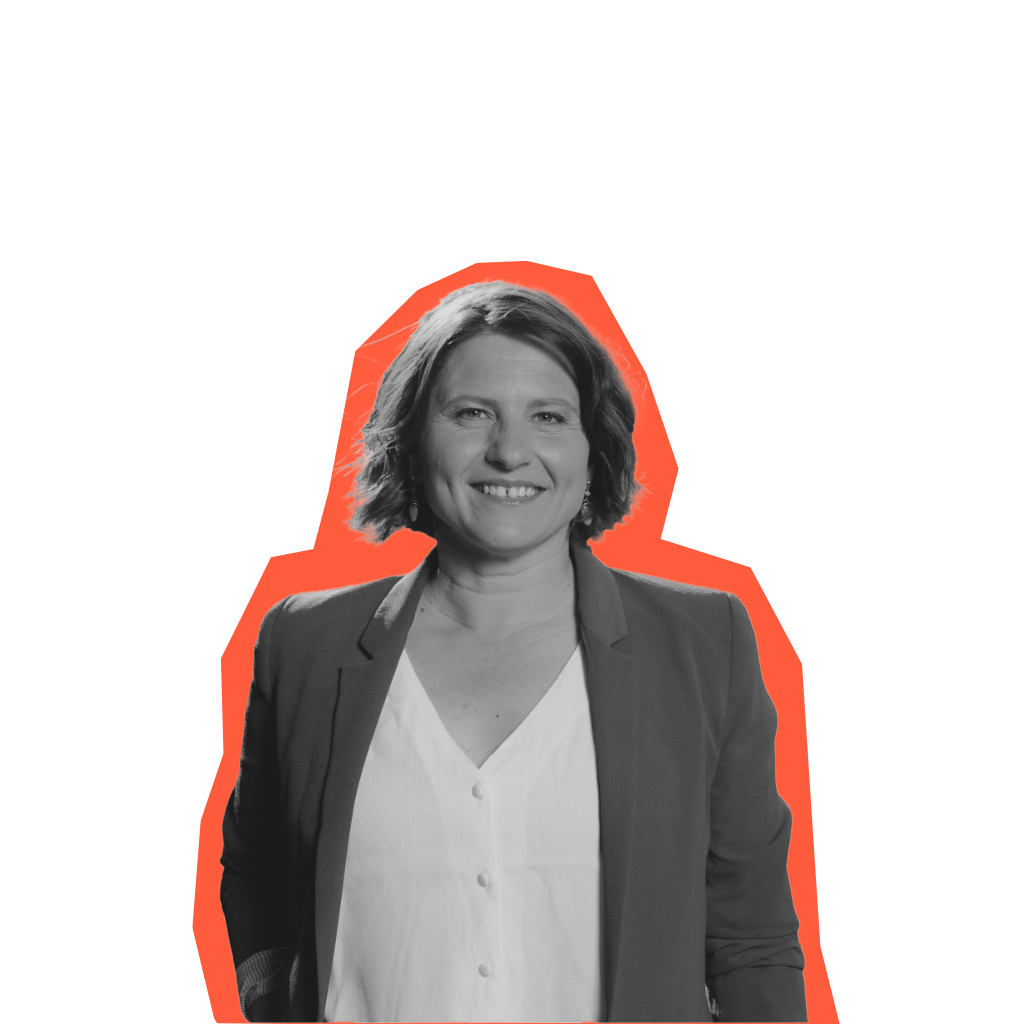
roxana maracineanu
Roxana Maracineanu, born on May 7, 1975, in Bucharest, fled the Romanian dictatorship and moved to France at the age of 9, where she was granted refugee status and later obtained French citizenship. A former swimming champion (world champion in 1998, Olympic silver medalist in 2000), she became involved in social and political projects after her athletic career. Minister for Sports from 2018 to 2022, she fought against gender-based and sexual violence in sports by launching the Signal-Sports reporting system, standardizing background checks for volunteers, and requiring federations to implement protective measures. In 2023, she became the Secretary General of MIPROF, where she leads initiatives to protect women from violence and coordinate efforts against human trafficking, particularly through the third national plan for 2024-2027.

christelle wieder
Christelle Wieder is the Deputy Mayor of Strasbourg, responsible for implementing the municipal policy on women’s rights and gender equality since June 2020. Strasbourg has been pursuing a feminist and committed policy for women’s rights for a decade.

aliénor laurent
President of Osez le féminisme and of the Bas-Rhin branch in Strasbourg, Aliénor has been involved in feminism since 2018, and is particularly passionate about feminist policy issues.

alyssa ahrabare
alyssa ahrabare
“Let’s stop protecting industries that confuse sexuality with violence, and freedom with domination.”
Alyssa Ahrabare is the President of the French Coordination for the European Women’s Lobby, a network of 80 women’s rights organisations. A lawyer specialising in fundamental freedoms, she is also a consultant and trainer. She has authored several publications on access to rights for vulnerable groups, particularly migrant women, refugees, and asylum seekers, as well as on non-discrimination.
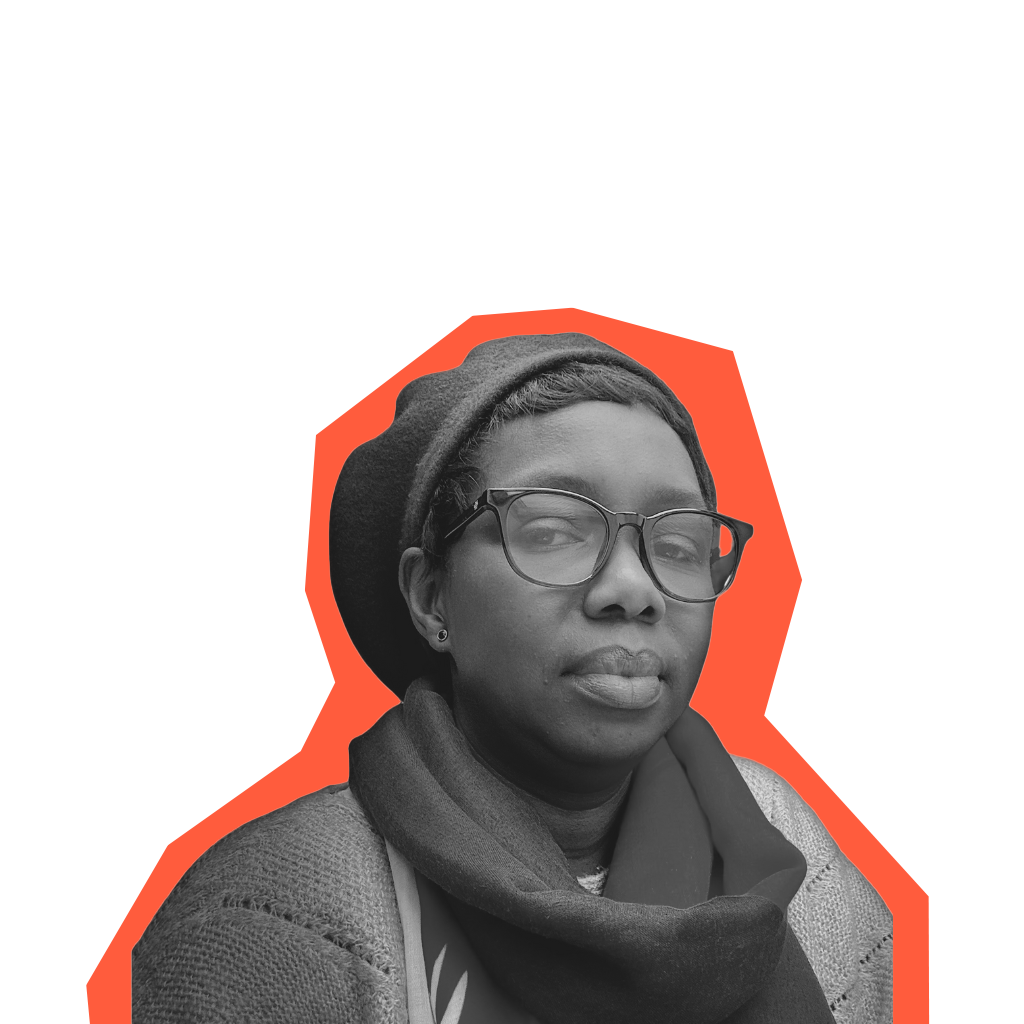
adama-sira
LE BLAY
Adama-Sira is the co-President of the European Network of Migrant Women (ENoMW), a Europe-wide feminist migrant women led platform with membership in over 20 European state, that advocates at EU and international level for the dignity, right, and freedoms of migrant, refugee and minority ethnic women and girls in Europe. Adama is a lawyer specialising in violence against women and girls, with 15 years professional experience in this field, and the founder and manager of Olympe – an Association in France that provides comprehensive support to women victims of domestic violence and migrant women in their dealings with police, courts and social services. At Olympe, she sensitises the public on criminal, civil, immigration, and private international law, trains professionals, and runs awareness-raising campaigns. She also works at the international level providing recommendations on migrant women’s rights to relevant institutions.

anne-cécile mailfert
Anne-Cécile Mailfert is President of the Executive Board of the Fondation des Femmes, which she co-founded in 2016 and which became a Fondation reconnue d’utilité publique in 2024. With €14m redistributed to 600 projects in favor of women’s rights, the Foundation has launched major campaigns such as #MaintenantOnAgit, linked to #MeToo. It publishes reports, advocates a framework law against sexual violence and supports legal action for gender equality. An activist for 15 years, she is a recognized expert on violence against women, a columnist on France Inter, author of two feminist books and Chevalière des Arts et des Lettres.

céline piques
céline piques
“Behind the word pornography lies an unbearable list of patriarchal violences: torture, rape, trafficking, child pornography, incitement to misogynistic and racist hatred. Pornography is both a site of male violence and the main tool of patriarchal propaganda that dehumanizes women and eroticizes violence.”
Writer of the report “Pornocriminality : putting an end to impunity in the pornography industry” by the High Council for Equality, published in September 2023. The High Council of Equality
Member of the Board of Osez le Féminisme and the organisation’s lead on the fight against pornocriminality and online sexual exploitation. Expert on sexist and sexual violence. Author of the feminist essay “Déviriliser le Monde”
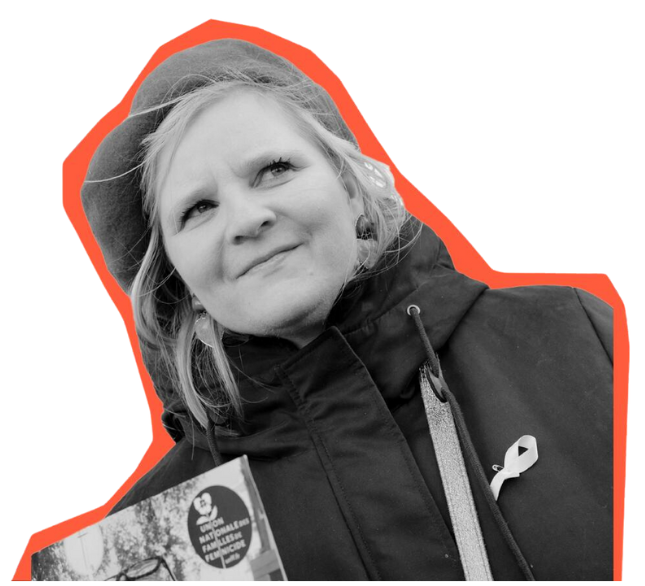
floriane volt
floriane volt
Floriane Volt was a lawyer and ministerial advisor before joining the Fondation des Femmes. A volunteer since the foundation’s creation in 2016, she contributed to the establishment of the Force Juridique, a network of legal professionals supporting feminist organizations. For the past five years, Floriane has been the Director of Public and Legal Affairs at the Fondation des Femmes, leading advocacy campaigns, overseeing reports, and supporting strategic litigation to advance women’s rights.
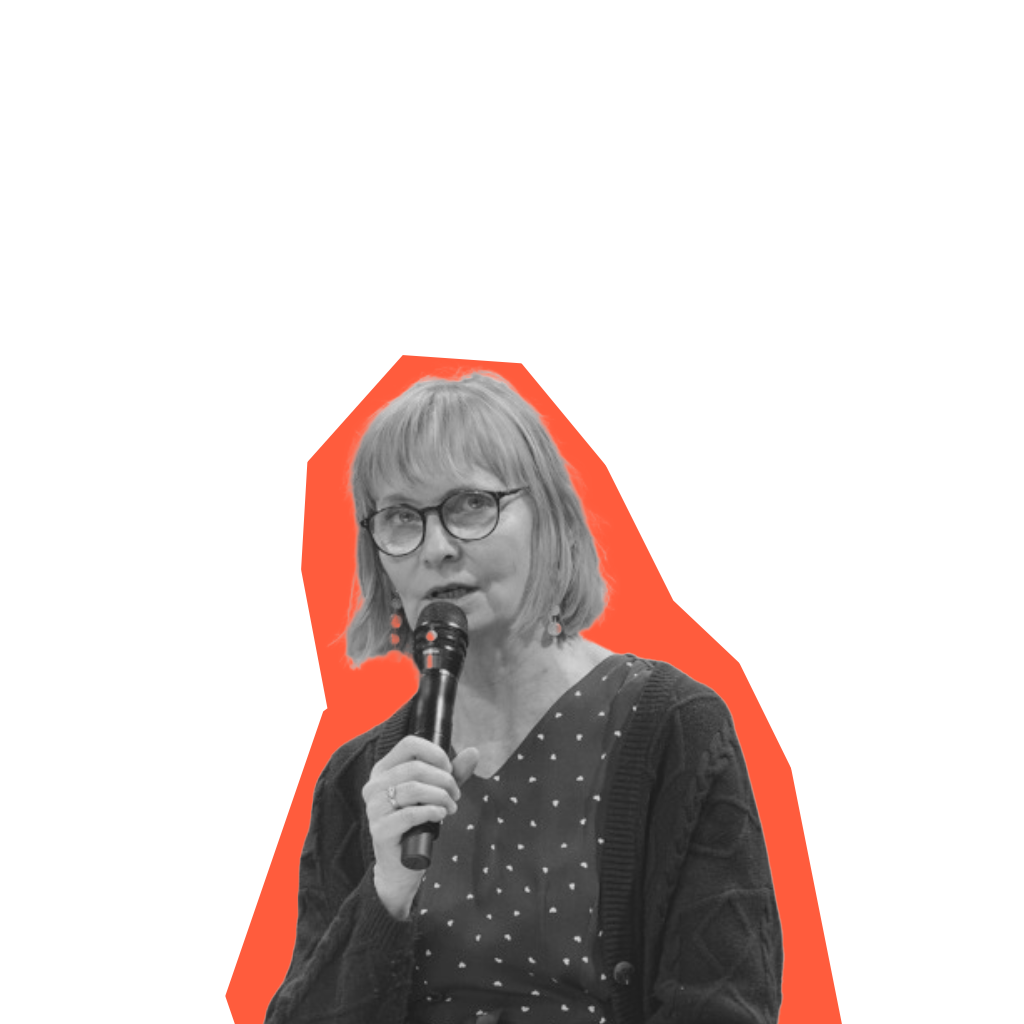
FRANÇOISE BRIE
“The organizations working with victims of prostitution, through their advocacy, based on their observations and expertise, played a significant role in the development of the abolitionist law of 2016 in France. They continue to defend and promote it as it addresses the issues faced by those affected, the vast majority of whom are women; it also helps to prevent and fight against this sexist violence. Prostitution is indeed incompatible with human dignity and with the principle of equality between women and men.”
Spécialiste des droits des femmes et des droits humains :
Membre du Haut Conseil à l’Egalité (HCE) (France) de 2013 à 2019. Membre du Groupe d’experts sur la lutte contre la violence à l’encontre des femmes et la violence domestique (GREVIO) (Convention d’Istanbul – Conseil de l’Europe) de 2015 à 2023. Directrice générale de la Fédération Nationale Solidarité Femmes et de la ligne d’écoute nationale 3919 Violences Femmes Info de 2017 à 2024 et auparavant de l’Escale Solidarité Femmes, centre d’accueil et d’hébergement pour femmes victimes de violences de 2004 à 2017. Membre du Comité Exécutif de la fondation Raja. Activiste dans différentes ONGs de défense des droits des femmes et de lutte contre les violences à l’encontre des femmes dont l’Amicale du Nid et la CLEF.

héma
SIBI
Héma Sibi is the Executive Director of CAP International. Héma is a women’s rights activist and jurist specialised in international human rights law. She is the author of Last Girl First! Prostitution at the Intersection of Sexist, Racist, and Class-Based Oppressions which analyses the systemic inequalities fostering the sexual and economic exploitation of the most marginalised women and girls worldwide. She also serves as the spokesperson for Mouvement du Nid, France. Her professional experience includes working with the United Nations High Commissioner for Refugees (UNHCR) and advocating for The ONE Campaign against extreme poverty.

LORRAINE QUESTIAUX
“The most precise political definition of pornography that can be given is sexual fascism. Pornography is the main symbolic instrument of the oppression of women. It feeds, creates, and perpetuates hatred towards others. Its function is therefore social castration. It is a danger to peace and to all humanist societies. Above all, pornography reminds us that misogyny is the matrix of all fascist systems.”
Lawyer at the Paris bar, specializing in women’s rights and the fight against the prostitution and pornography system.
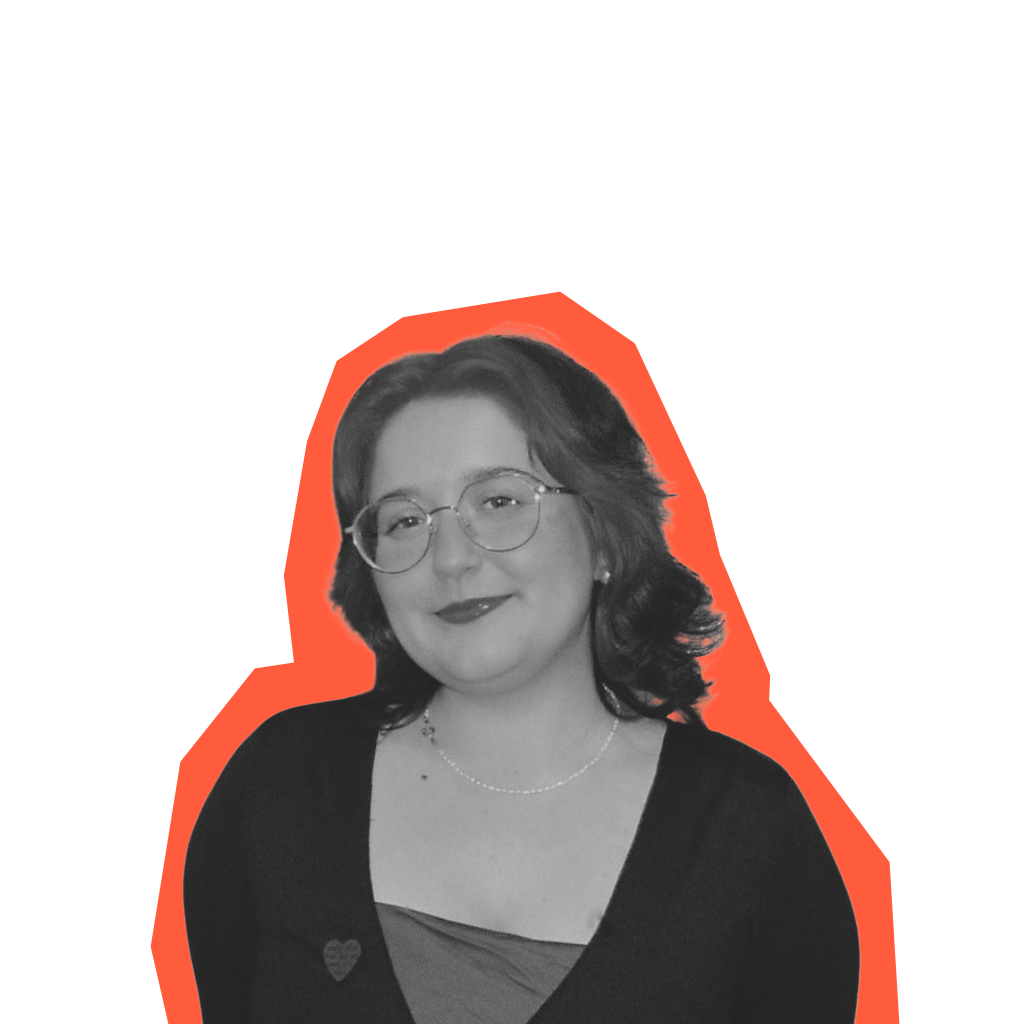
MARIANA BRANCO
“We perpetuate a system that profits from the hypersexualization of women, yet we don’t question why this happens.. Since this conversation must begin somewhere, I suggest focusing on OnlyFans and its history. The platform illustrates how a company generates millions annually through the exploitation of women’s bodies, with no societal scrutiny or critique.”
Graduated in History and currently completing her Master’s in Women’s Studies – Women in Society and Culture at NOVA-FCSH. She is a research fellow on the project Portuguese Language Writers during the Military Dictatorship and the Estado Novo in Portugal, Africa, Asia, and Countries of Emigration. She has presented her research on OnlyFans and online sexual violence at conferences and colloquiums. Additionally, she volunteers for the Portuguese Platform for Women’s Rights (PpDM).
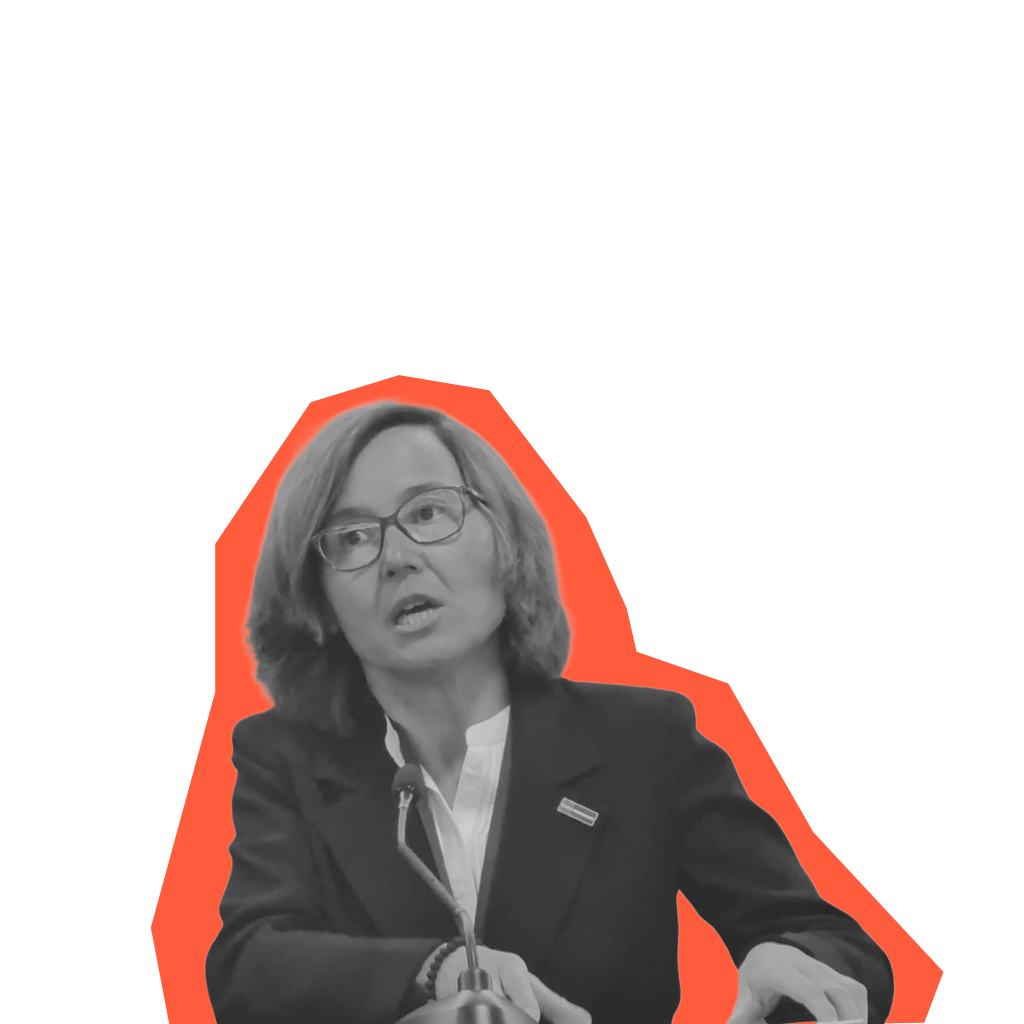
MIÉ KOHIYAMA
“Behind every child pornography image or video, there is an actual sexual crime.”
Trained as a journalist, she has been a children’s rights activist for over 10 years. A survivor of child sexual abuse, she was the first to raise the issue of traumatic amnesia in relation to the criminal statute of limitations before the French Supreme Court. Under the pseudonym Cécile B, she is the author of Le Petit Vélo Blanc (Calman Lévy, 2015).

mireia crespo
Mireia Crespo has been director of isala since 2020. After studying international relations, she worked in Brussels as a communications officer, first for Protection International and then for the Centre d’Action Laïque. A feminist and activist, she joined isala, which supports prostitutes by offering them concrete alternatives towards a new life. She runs the association with a team of volunteers in the field, and plays an active part in the fight against the prostitution system.

María Hernández-Mora
A clinical psychologist and psychotherapist, she specialises in behavioural addictions, particularly sexual and pornography addiction. She is the founder of the Pornography Addiction Unit at CSAPA Imagine (95) and the Réseau de Cliniciens de l’Addiction Pornographique et Sexuelle (CAPS) in France. Holding a doctorate in psychology, she authored the first thesis in France on pornography addiction. In both France and Spain, she is actively developing her clinical and research work on the impact of pornography on health and human relationships.
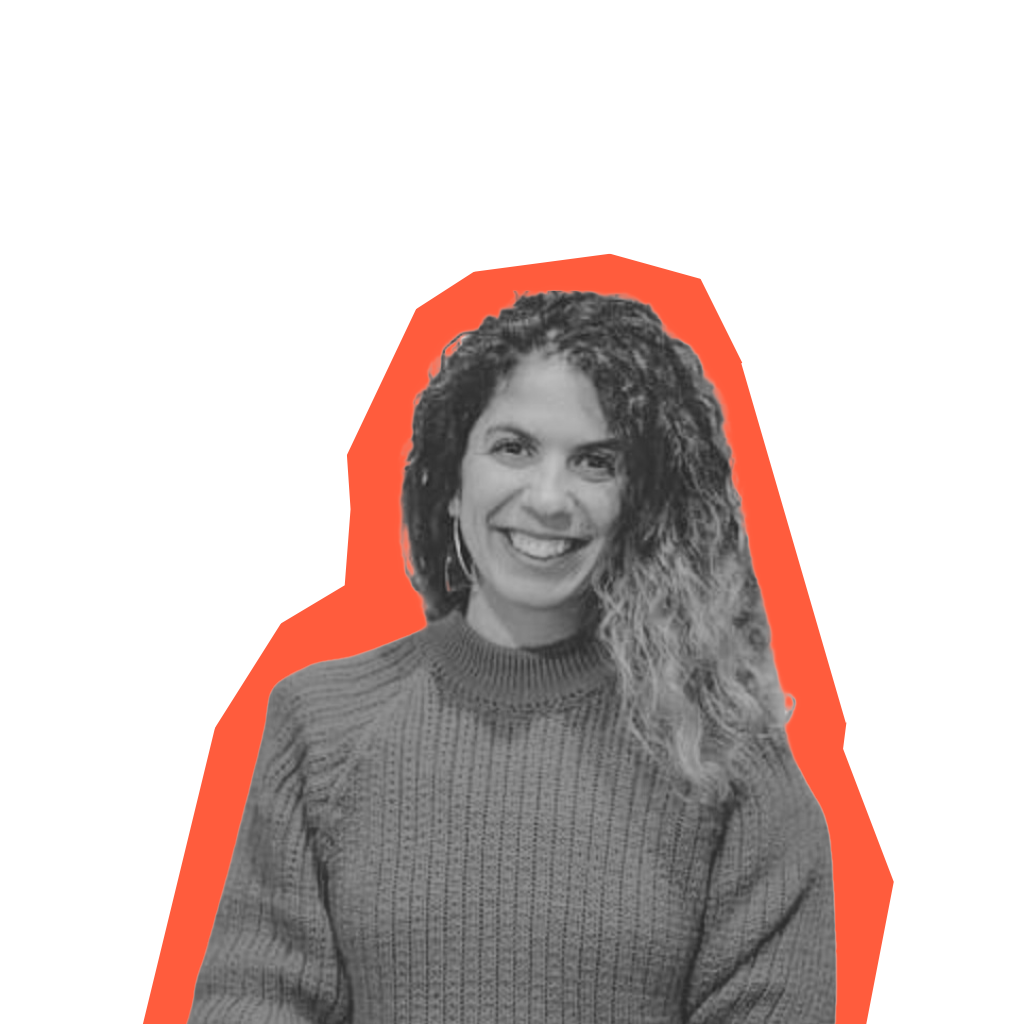
MARIA JOÃO FAUSTINO
“AI-Facilitated sexual violence (“Deepfake”)”
Maria João Faustino is a researcher at CES-UC, University of Coimbra. She holds a PhD in Psychology from the University of Auckland, New Zealand. Her doctoral research focused on sexual violence and its gendered patterns. She has published about representations of sexual violence in the media, women’s experiences of consent and coercion, and new interlinks between sexuality and technology. She is a member of the Executive Committee of the European Women’s Lobby, representing the Portuguese Platform for Women’s Rights.
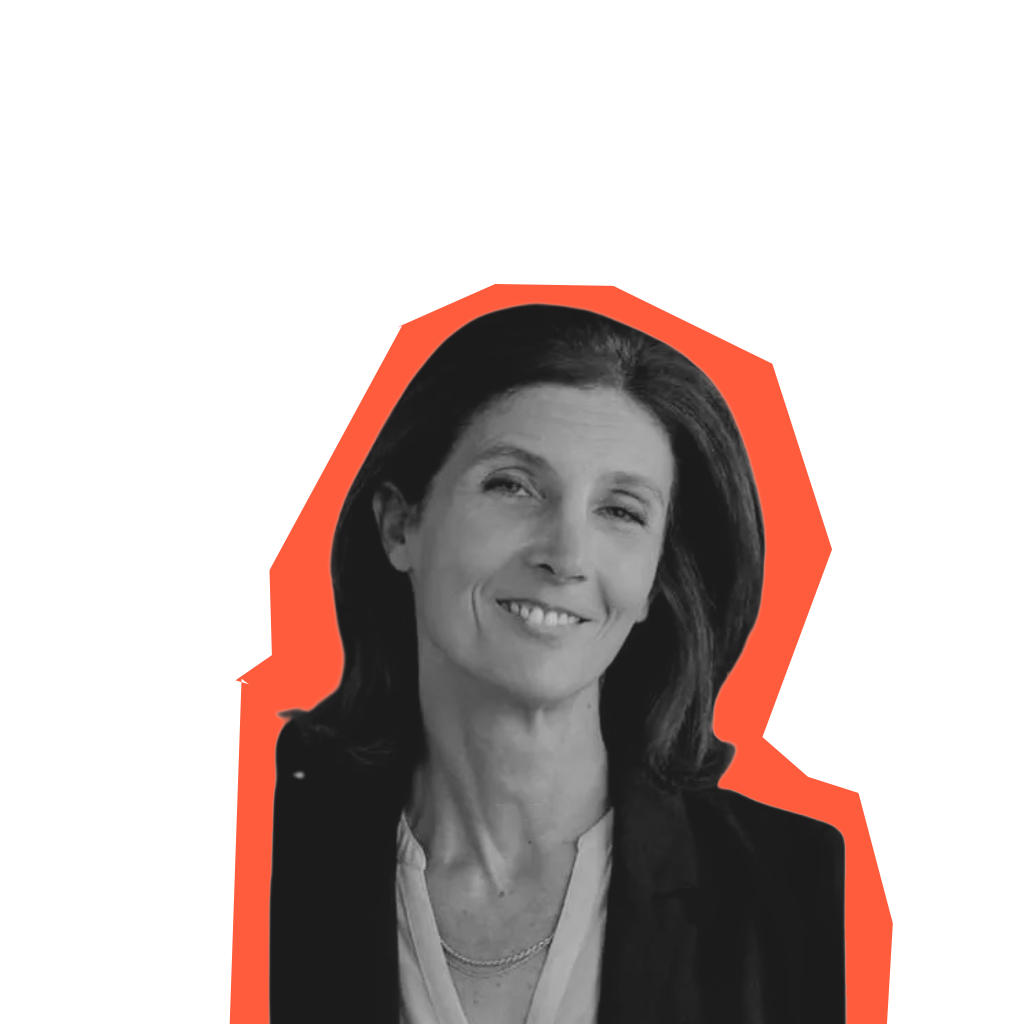
muriel fabre magnan
The author of several books, primarily published by Presses Universitaires de France, on topics such as introduction to law, contract law, tort law, and surrogate motherhood. Her most recent work is entitled L’institution de la liberté, PUF, 2nd edition, Quadrige, 2023.
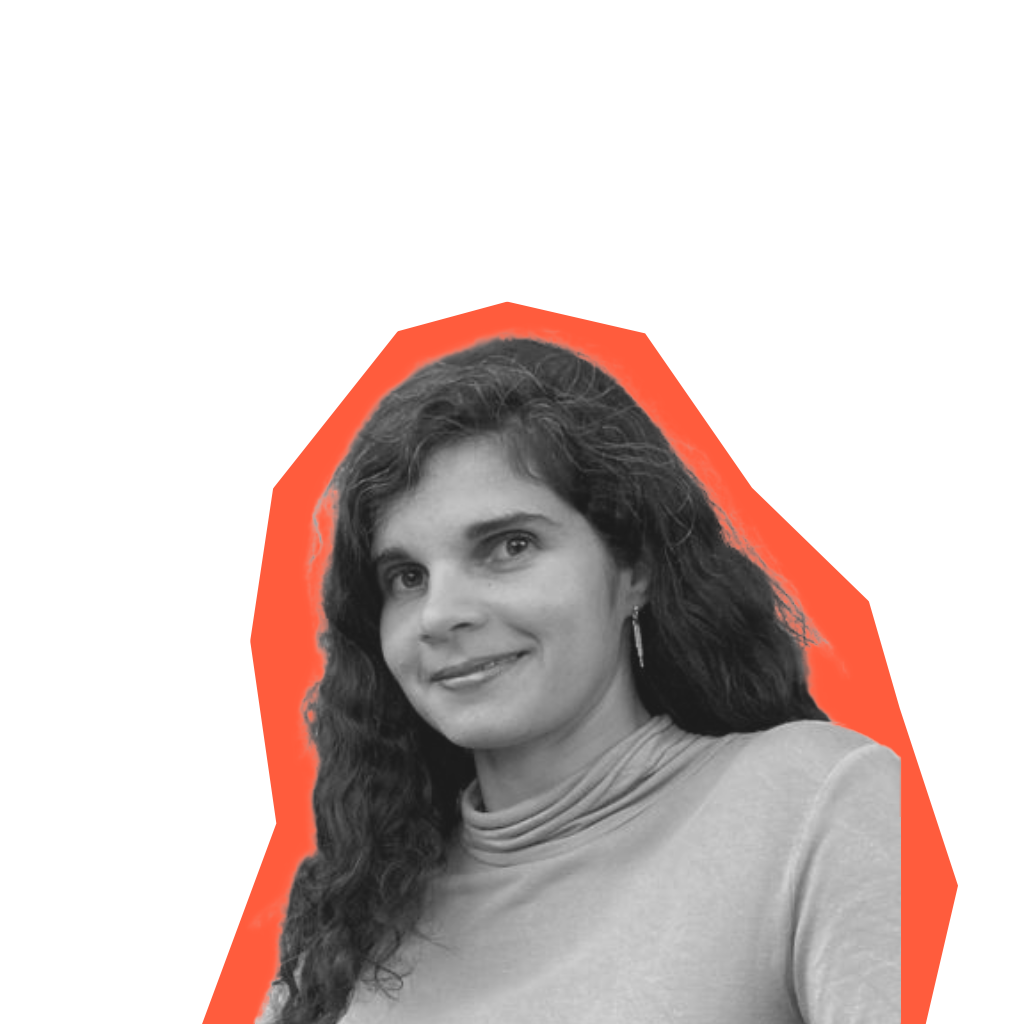
NATASHA MALVIYA
“In Belgium, the recent creation of an employee status does not establish any new rights for victims of prostitution and fails to address their actual needs, the overwhelming majority of whom are migrant women. On the contrary, the new legislation reinforces the social and psychological isolation they already live in, and does not respond to the wish expressed by the majority of them: to exit prostitution and to do so with dignity. By making prostitution a form of work, this legislation makes it possible to establish a contractual subordinate relationship between a victim of prostitution and their pimp, who now holds the status of ’employer’ under common labor law. This amounts to normalizing the exploitation of women’s bodies and sexuality: legitimizing the practice of men buying women from a third-party pimp who will be paid legally.”
A lawyer by training, she has been a volunteer with Isala for two years, actively contributing both in the field and as part of Isala’s advocacy team.
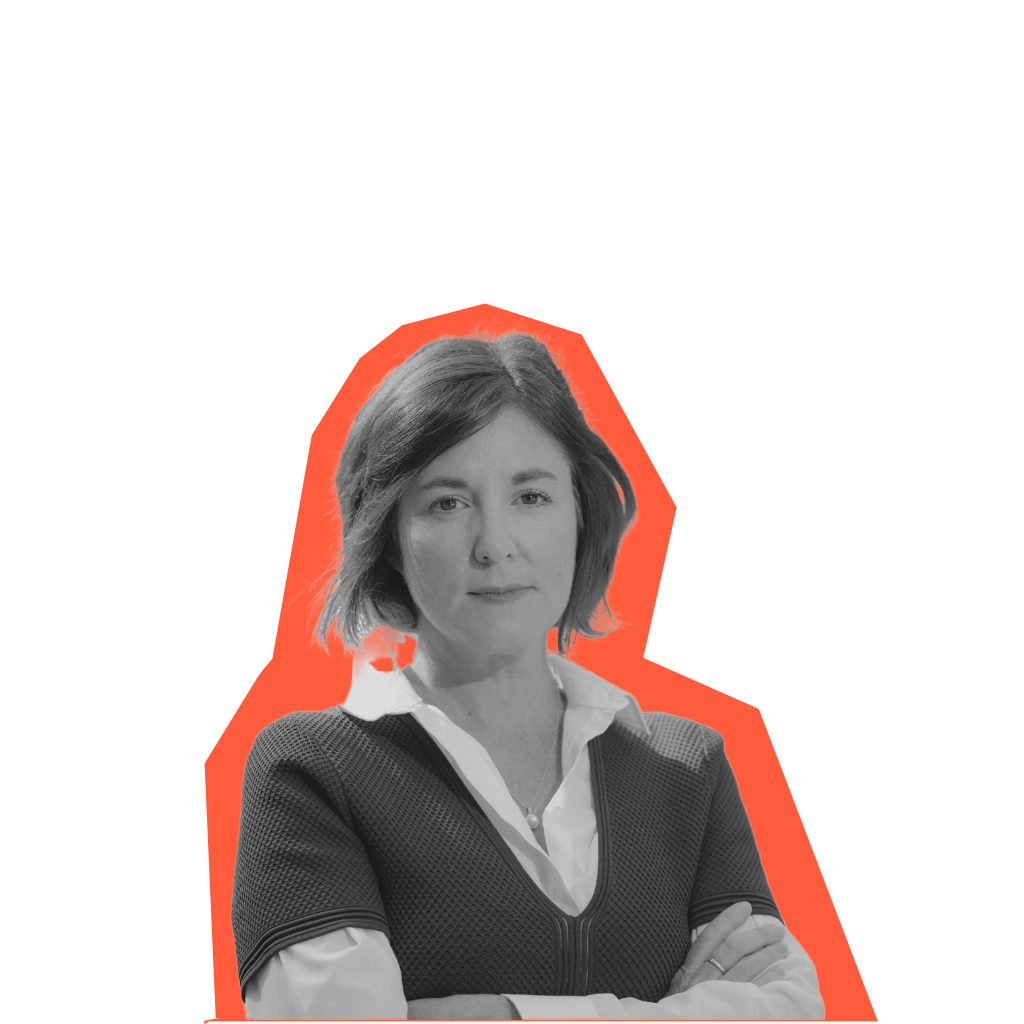
RUTH BRESLIN
“Our research focuses in particular on the central role played by prostitution advertising websites in facilitating and amplifying trafficking for the purpose of sexual exploitation by seamlessly connecting victims to a very broad ‘customer base’ of sex buyers. Sites such as these – also known as ‘sexual exploitation advertising’ websites (SEAs) – have proliferated across the globe and serve as a primary venue for commercial sexual exploitation.”
Ruth has over 25 years of research experience with NGOs and universities in Dublin, London, and New York. She holds a Master’s degree in Social Research Methods (Social Policy) from the London School of Economics and Political Science. Her work focuses on the prevention of violence against women and girls, with a particular emphasis on commercial sexual exploitation. Frequently consulted on the development of evidence-based policy and practice, she joined the SERP research program at University College Dublin in 2018, where she co-authored all studies. She currently leads the development of the new independent SERP Institute, creating innovative solutions to bridge the gap between research and frontline practice.
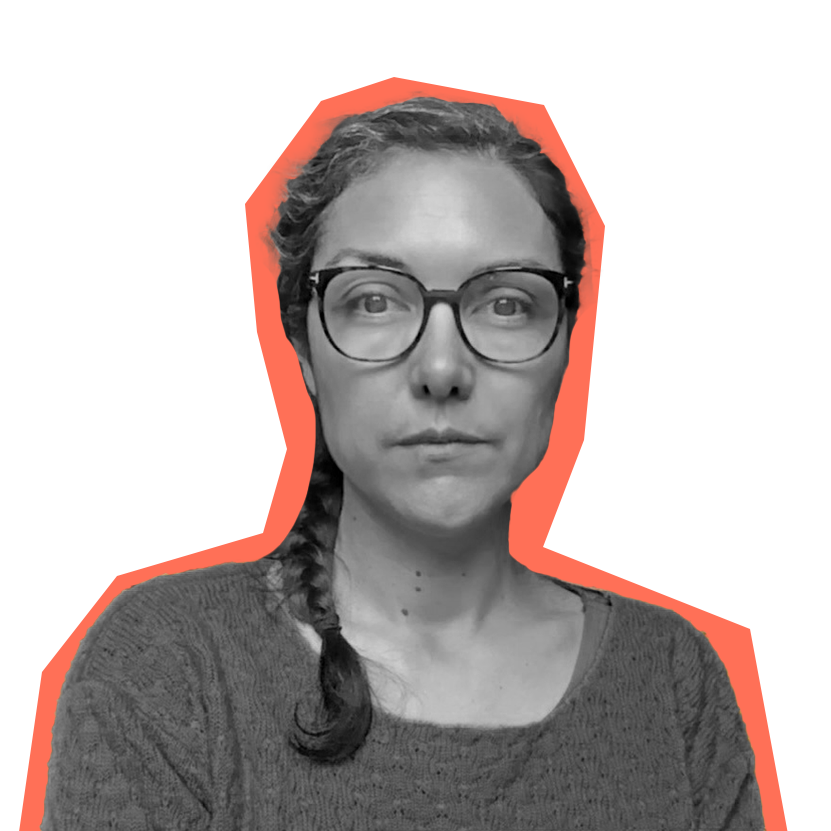
Stéphanie caradec
Feminist activist Stéphanie Caradec has been the director of Mouvement du Nid-France for eight years, a grassroots organization supporting prostituted persons and fighting against the prostitution system.
She is a member of the advisory committee of MIPROF and was previously a member of the High Council for Gender Equality. Before that, she worked at the National Assembly alongside Maud Olivier to advocate for the adoption of the April 13, 2016 law strengthening the fight against the prostitution system.

